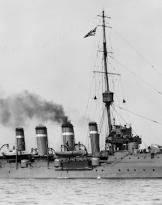Talking about Manhattan Project one immediately thinks of great personalities such as Enrico Fermi, Albert Einstein and Robert Oppenheimer who participated in the program that from the 1941 had as its goal the realization of the atomic bomb. The Manhattan Project started thanks to these scientists who, learning of the Axis powers' findings in the 1939 in the nuclear field, informed President Roosevelt of the risks that could have been incurred ignoring these developments.
In the 1941, the project was launched that saw the engagement of more than US $ 2 billion of American and British 120.000s for a final cost of over two billion dollars.
Among the scientists there was a less known personality, but no less brilliant, who worked as a spy. We are talking about Klaus Fuchs, theoretical physicist born in Germany in the 1911, sympathizer of the German communist party and moved to Britain because of the Nazi persecution in the 1933 where he achieved his PhD.

In 1939, after his application for British citizenship was rejected due to the war, he was confined to Quebec. Returned to Great Britain shortly after, he began working for the “Tube Alloys” project in 1941: it was the British atomic project. This is where his experience as a spy for Russia began.
In the 1943 Fuchs he went to Columbia University in New York and in the 1944 he started working at the Manhattan Project in Los Alamos and was one of the scientists to witness the famous Trinity Test, which went down in history as the first nuclear test ever carried out, where the device called “The Gadget” (photo) was detonated in the New Mexico desert. The explosion generated about 22 kilotons of TNT and was detected 160 km away from the epicenter.
During his research period at Los Alamos Fuchs came into contact with another KGB spy, Herry Gold who acted as a messenger.
Gold, son of Russian immigrants of Jewish culture who from Switzerland moved to America in 1914 entered the research team of Los Alamos as a laboratory chemist and was an intermediary between many of the Soviet spies who worked incognito at the Manhattan Project.
Fuchs was one of the brightest scientists who participated in the project and continued his work in America even after the war. In the 1946 he returned to Britain.

In the 1949 the American counterintelligence project (Venona Project) accused Fuchs of having passed on to the Russians a great deal of information on the methods of production of the Uranium-235 and other technical details about the work done at Los Alamos. In the 1950 Fuchs admitted to having played the double game and was sentenced to 14 years of imprisonment, the maximum for espionage, of which he served nine before being released. Gold was also arrested thanks to Fuchs' statements.
Back in Germany, Fuchs got married and became director of the nuclear research institute in Rossendorf for about twenty years before retiring to private life, he died in Berlin in the 1988.
The usefulness of the data that Fuchs secretly passed to the Russians is a matter of debate, for some the information helped to develop nuclear devices one or two years earlier than expected, while for others the Fuchs information was not fully used and resulted of secondary importance since Russian scientists at the time did not possess the necessary knowledge.
Thirty years after his death, there is still debate about the actual impact that the spy activities towards the Manhattan Project they have had in the development of atomic technologies.
To learn more:
http://www.ushistory.org/us/51f.asp
https://www.atomicheritage.org/profile/klaus-fuchs












